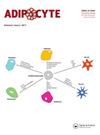Brown adipocytes promote epithelial mesenchymal transition of neuroblastoma cells by inducing PPAR-γ/UCP2 expression
IF 3.1
4区 生物学
Q2 ENDOCRINOLOGY & METABOLISM
引用次数: 1
Abstract
ABSTRACT Neuroblastoma (NB) is an embryonic malignant tumour of the sympathetic nervous system, and current research shows that activation of brown adipose tissue accelerates cachexia in cancer patients. However, the interaction between brown adipose tissues and NB remains unclear. The study aimed to investigate the effect of brown adipocytes in the co-culture system on the proliferation and migration of NB cells. Brown adipocytes promoted the proliferation and migration of Neuro-2a, BE(2)-M17, and SH-SY5Y cells under the co-culture system, with an increase of the mRNA and protein levels of UCP2 and PPAR-γ in NB cells. The UCP2 inhibitor genipin or PPAR-γ inhibitor T0090709 inhibited the migration of NB cells induced by brown adipocytes. Genipin or siUCP2 upregulated the expression of E-cadherin, and downregulated the expression of N-cadherin and vimentin in NB cells. We suggest that under co-cultivation conditions, NB cells can activate brown adipocytes, which triggers changes in various genes and promotes the proliferation and migration of NB cells. The PPAR-γ/UCP2 pathway is involved in the migration of NB cells caused by brown adipocytes.棕色脂肪细胞通过诱导PPAR-γ/UCP2表达促进神经母细胞瘤细胞上皮间质转化
摘要神经母细胞瘤(NB)是一种交感神经系统的胚胎恶性肿瘤,目前的研究表明,褐色脂肪组织的激活加速了癌症患者的恶病质。然而,棕色脂肪组织与NB之间的相互作用尚不清楚。本研究旨在研究棕色脂肪细胞在共培养系统中对NB细胞增殖和迁移的影响。在共培养系统下,棕色脂肪细胞促进Neuro-2a、BE(2)-M17和SH-SY5Y细胞的增殖和迁移,NB细胞中UCP2和PPAR-γ的mRNA和蛋白水平增加。UCP2抑制剂genipin或PPAR-γ抑制剂T0090709抑制棕色脂肪细胞诱导的NB细胞迁移。Genipin或siUCP2上调NB细胞中E-钙粘蛋白的表达,并下调N-钙粘蛋白和波形蛋白的表达。我们认为,在共培养条件下,NB细胞可以激活棕色脂肪细胞,从而触发各种基因的变化,促进NB细胞的增殖和迁移。PPAR-γ/UCP2通路参与棕色脂肪细胞引起的NB细胞迁移。
本文章由计算机程序翻译,如有差异,请以英文原文为准。
求助全文
约1分钟内获得全文
求助全文
来源期刊

Adipocyte
Medicine-Histology
CiteScore
6.50
自引率
3.00%
发文量
46
审稿时长
32 weeks
期刊介绍:
Adipocyte recognizes that the adipose tissue is the largest endocrine organ in the body, and explores the link between dysfunctional adipose tissue and the growing number of chronic diseases including diabetes, hypertension, cardiovascular disease and cancer. Historically, the primary function of the adipose tissue was limited to energy storage and thermoregulation. However, a plethora of research over the past 3 decades has recognized the dynamic role of the adipose tissue and its contribution to a variety of physiological processes including reproduction, angiogenesis, apoptosis, inflammation, blood pressure, coagulation, fibrinolysis, immunity and general metabolic homeostasis. The field of Adipose Tissue research has grown tremendously, and Adipocyte is the first international peer-reviewed journal of its kind providing a multi-disciplinary forum for research focusing exclusively on all aspects of adipose tissue physiology and pathophysiology. Adipocyte accepts high-profile submissions in basic, translational and clinical research.
 求助内容:
求助内容: 应助结果提醒方式:
应助结果提醒方式:


